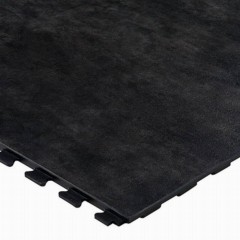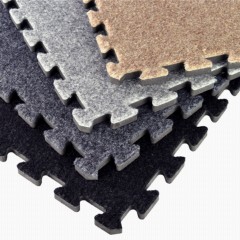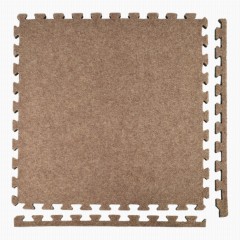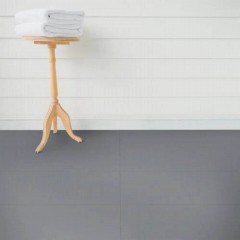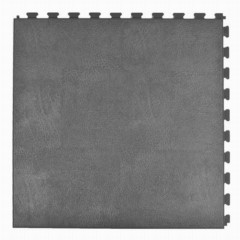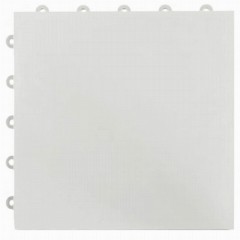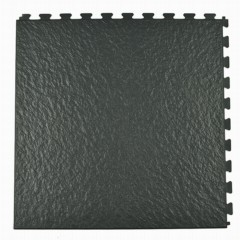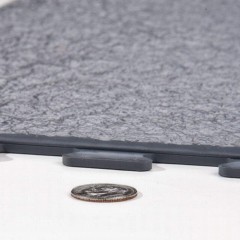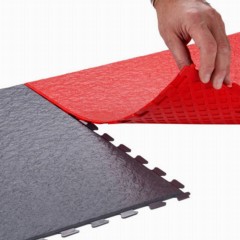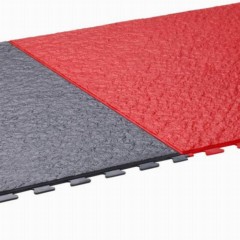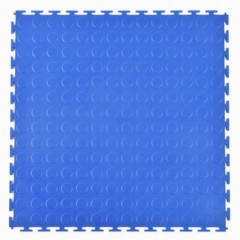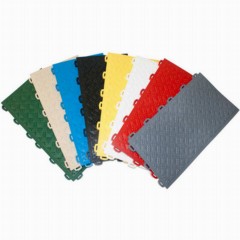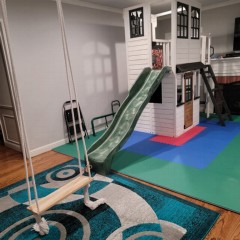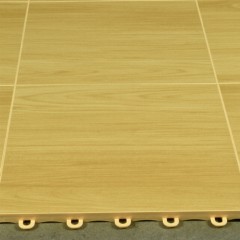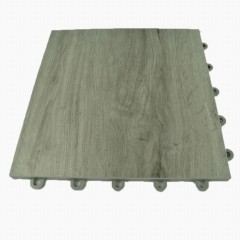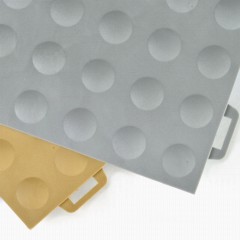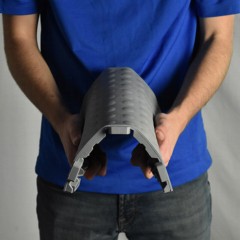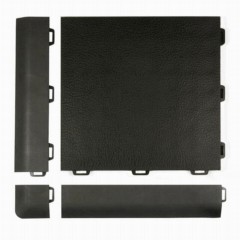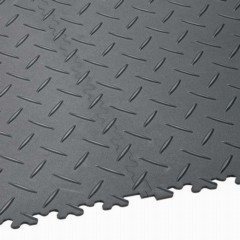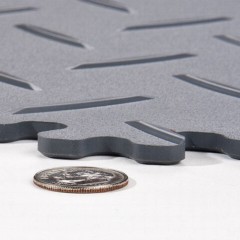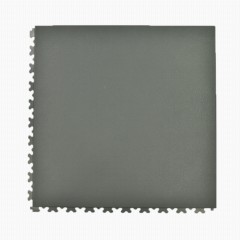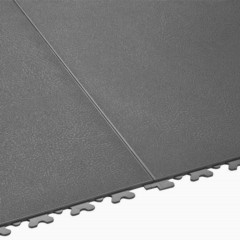Waterproof Basement Flooring Options
When you have concerns over moisture in your basement floor, multiple waterproof basement flooring products are available that are easy to install, easy to clean, and can increase air flow, which may decrease the formation of mildew and odor.
At Greatmats, we have a range of basement floor tiles that do not absorb moisture, including some materials you might not expect, like foam and carpeting. Additionally, we offer raised modular basement floor tiles and waterproof products that allow flow of air underneath to help with evaporation.
Types of Waterproof Basement Flooring
We offer multiple interlocking floor tiles, waterproof and ready to install, that can go directly over concrete for easy DIY basement installations.
- Snap Together Tiles: Snap-together basement floor tiles have a hidden snap-together design that allows the final layout to have clean lines and a pleasing design.
- Interlocking Tiles: Puzzle-edge interlocking waterproof floor tiles look like a jigsaw puzzle. Just connect the edges together to create the final layout.
The advantage of these products is that you can do the work yourself without the need for glue, so you can disassemble them whenever desired.
Base Options for Waterproof Basement Floor Tiles
When you are seeking the best ideas for waterproof tiles for a basement, think about the amount and frequency of moisture you have in the area.
- Raised Base: A raised base tile has small legs that support the underside of the tile away from the subfloor, allowing air flow underneath the tiles. This works well for areas that have moisture from seepage or from flooding.
- Flat Tiles: Tiles with a completely flat bottom will sit tight to the subfloor, so no air moves underneath. This design works well for areas that have rare flooding or moisture issues.
Materials and Styles of Waterproof Flooring for Basements
You can select among multiple materials for your waterproof basement tiles from Greatmats. Think about how you plan to use the area to find the right waterproof flooring for your needs.
- PVC Plastic: These are flexible tiles that are easy to install. PVC is a pliable plastic and thus provides anti-fatigue benefits.
- EVA Foam: These are cushioned tiles and are waterproof; however, these tiles will act as a vapor barrier, so they must be removed after significant moisture exposure to allow everything to dry out properly.
- Polypropylene Plastic: These are rigid tiles that work where you need a highly durable option. These tiles have a raised base structure and will also function well as a subfloor for many other flooring types.
Waterproof Basement Flooring FAQ
What is the best option for how to cover a wet basement floor?
When seeking to
cover a wet basement floor, having a specially designed set of tiles that can withstand moisture and that help the subfloor to dry through evaporation is the best option. For significant and frequent moisture, raised base tiles are best. For occasional moisture, flat-based tiles will work in smaller areas.
What is a vapor barrier?
A
vapor barrier gives your flooring protection from a damp subfloor, such as you may have if moisture seeps through the concrete foundation. Plastic sheeting is a common vapor barrier.
What is a good flooring option for a basement that only occasionally gets wet?
If you have
occasional seepage or leaking in a basement foundation that’s always in the same location, select flooring tiles with a raised base design. You can simply pull up the tiles in the affected area until the location dries.
How do you install raised-base basement tiles?
Installing raised basement tiles is an easy DIY installation for most people. Just connect the tabs of tiles together into the loops, and the system will hold together tightly without the need for glue. The tabs and loops are on the plastic base section of the tile, so they are durable.
What are the best floating basement floor ideas?
For the
best floating basement floor layout, look for raised tiles. These designs allow air to flow underneath the tiles, helping any moisture in the area to evaporate efficiently. You can leave the tiles in place when a little bit of moisture is present, rather than having to disassemble the entire floor each time.
1 reviews •2 Colors
$8328 /Carton You Save 19%$4.00/sqftShop $6986 /Carton You Save 15%$5.17/sqftShop$8390 /Carton You Save 15%$6.21/sqftShop$660 /Tile You Save 26%$6.60/sqftShips Out in 1-3 Working DaysShop$10029 /Carton You Save 19%$4.82/sqftShop$1368 /Tile You Save 20%$9.84/sqftShop$695 /Tile You Save 42%$1.79/sqftShips Out in 1-3 Working Days SustainableShop$495 /Tile You Save 44%$4.95/sqftShips Out in 1-3 Working DaysShop$8512 /Carton You Save 20%$5.16/sqftShop$475 /TileShips Out in 1-3 Working DaysShop$475 /TileShips Out in 1-3 Working DaysShop$575 /TileShips Out in 1-3 Working DaysShop$399 /TileShips Out in 1-3 Working DaysShop$689 /Tile You Save 28%$6.89/sqftShips Out in 1-3 Working DaysShop$610 /Tile You Save 27%$6.10/sqftShips Out in 1-3 Working DaysShop$12980 /Carton You Save 15%$4.01/sqftShop$13632 /Carton You Save 15%$5.05/sqftShop
$6986 /Carton You Save 15%$5.17/sqftShop$8390 /Carton You Save 15%$6.21/sqftShop$660 /Tile You Save 26%$6.60/sqftShips Out in 1-3 Working DaysShop$10029 /Carton You Save 19%$4.82/sqftShop$1368 /Tile You Save 20%$9.84/sqftShop$695 /Tile You Save 42%$1.79/sqftShips Out in 1-3 Working Days SustainableShop$495 /Tile You Save 44%$4.95/sqftShips Out in 1-3 Working DaysShop$8512 /Carton You Save 20%$5.16/sqftShop$475 /TileShips Out in 1-3 Working DaysShop$475 /TileShips Out in 1-3 Working DaysShop$575 /TileShips Out in 1-3 Working DaysShop$399 /TileShips Out in 1-3 Working DaysShop$689 /Tile You Save 28%$6.89/sqftShips Out in 1-3 Working DaysShop$610 /Tile You Save 27%$6.10/sqftShips Out in 1-3 Working DaysShop$12980 /Carton You Save 15%$4.01/sqftShop$13632 /Carton You Save 15%$5.05/sqftShop







